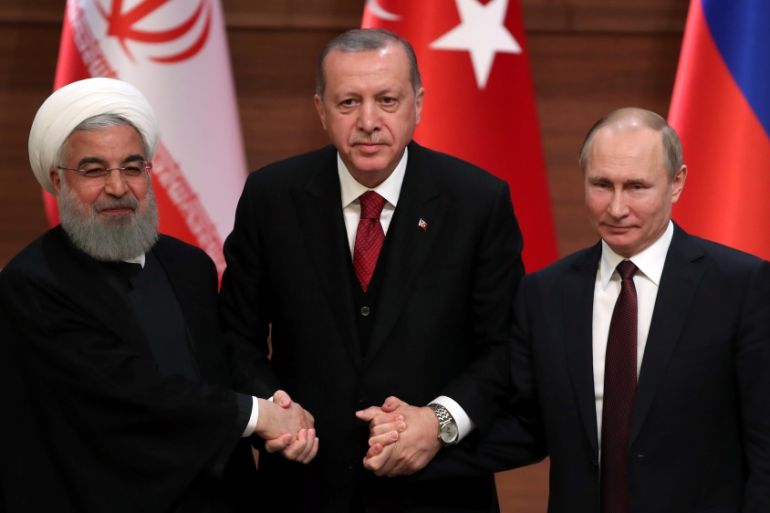What next for Syria after the US-led attacks?
Russia, Iran and Turkey will determine the future of Syria, as France and Britain did 100 years ago.

As the dust settles from Saturday’s Franco-Anglo-American missile attacks against Syrian targets, we find once again that narrow military action in one corner of that ravaged country may have little impact on the wider political and security picture.
The current geopolitics of the Syrian conflict are more complex and intractable than ever before because it is no longer a single issue contest with two clear protagonists who can be engaged in a political negotiation to end the war.
The dynamics of the military attack, in fact, clarify the intricate diplomatic dynamics that we can expect to see in the months and years ahead. The attacks on narrowly defined Syrian targets were planned carefully to avoid hitting any Russian, Iranian, and Hezbollah targets, as well as Turkish assets on the ground.
The importance of these four actors – as has been proven for a few years now – is that they are all prepared to engage directly in warfare inside Syria, even if pursuing different reasons. By contrast, the United States, other Western powers, and Gulf states like Saudi Arabia, the United Arab Emirates and Qatar, which have assisted rebel forces against Bashar al-Assad‘s regime, have indicated that they are not prepared for prolonged direct combat inside Syria.
So, as the world continues to seek diplomatic progress towards ending the war, Russia, Iran, Turkey, and Hezbollah will continue to dominate the situation on the ground. Meanwhile, the role of the West in the future of the Middle East remains in transition to an unclear destination.
A new mandate for Syria
The last two years of Russian, Iranian, Syrian, and Hezbollah military operations on the ground have achieved effective victory over various armed groups opposing the Assad regime. Two critical issues, however, remain.
One is the fate of the northeastern regions where Syrian Kurds now enjoy some self-rule but face opposition from both the Syrian and Turkish governments. The other is what happens to the tens of thousands of rebel fighters that belong to a mixed bag of Islamist and secular groups, now mostly encircled in a few areas in the northwest and south of the country.
Once those two issues are clarified, the pressing question of the future of Syria will have to be tackled. The Sochi and Ankara meetings between the presidents of Russia, Turkey and Iran are an important sign that Syria today is experiencing many of the same dynamics that it did 100 years ago.
At that time, British and French colonial officials shaped its existence as a new state in a new regional order that mainly suited their interests, with Turkish, Russian, American, Zionist and other players entering the fray when they could.
That external actors are once again shaping Syria’s future without taking into consideration the will of the Syrian people means that we are likely to see a repeat of the inherent weaknesses it suffered a century ago. A country that is created or reconfigured mainly according to the wishes of foreign powers, and does not allow its own people a role in decision-making, will find it difficult to achieve full sovereignty or stability.
States managed perpetually by a very small powerful elite almost certainly suffer the consequent abuse of power, corruption, development imbalances, social injustices, and a sense of helplessness which triggered the Arab uprisings in 2011 and ultimately sparked the Syrian civil war.
The future role of the West in the Middle East
In the face of these immense challenges, the Saturday air attacks against three Syrian targets appear marginal to the larger picture of Syria’s real stresses and future priorities. The tripartite Franco-Anglo-American attacks that aimed to punish the Syrian government and deter it from using chemical weapons will probably succeed in briefly stopping the use of these barbaric instruments of war, as they have done briefly in the past.
But Western attacks on Middle Eastern targets such as al-Qaeda since the 1990s have pushed the region further towards militarism and chaos.
Al-Qaeda, specifically, is bigger and more diffused today than it was 25 years ago. Weaker governments and insecurity have also provided openings for local “terror” groups and other foreign powers to act at will and spurred greater local defiance against the US and other Western powers.
Most significantly, Western and Arab states that have used proxy military and political means to “roll back” Iranian influence in Arab lands have achieved the opposite. Iranian, Russian, Hezbollah, and Turkish influence in Syria and other Arab countries has grown steadily, in line with the persistent militarism of the US and other Western powers.
From Roman times to Donald Trump, Emmanuel Macron and Theresa May today, these lessons keep being learned and re-learned. Only addressing the root causes of political violence in the Middle East through political and socioeconomic means will end the violence, run the dictators out of town, leave no reason for foreign powers to engage militarily in this region, and achieve peace and prosperity for its people who mostly remain helpless before their own and foreign killers.
The views expressed in this article are the author’s own and do not necessarily reflect Al Jazeera’s editorial stance.
